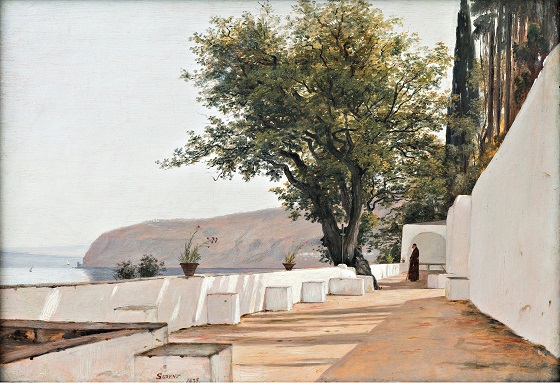
(Source: Nivaagaard Collection)
“The world is the totality of facts,” said Wittgenstein, “not things.” His early philosophy is no longer as fashionable as it once was, and he himself rejected it later in his life, but I’ve never really been able to shake the hold it got on me when I first read it. “We make ourselves pictures of the facts,” he also said, and I’ve made a great deal of that through the years.
“To think is to draw logical pictures of facts,” I tweeted yesterday, for example. “Philosophy is the art of their arrangement.” That was almost a plagiary of Wittgenstein, who said that propositions are logical pictures of facts, that such pictures are thoughts, and that philosophy could confine itself entirely to the perspicuous arrangement of scientific propositions. The austere “modernism” of that project has always appealled to me.
It is my view that scholars are stewards of fact, intellectual housekeepers. They maintain the machinery we need to cultivate a “propositional attitude” — a posture of belief, if you will, in “facts of the matter”. Ezra Pound said that good writers keep the language efficient as a means of communication and I would argue that good academic writers do this mainly in regard to our ability to make factual claims and challenge them.
As Bertrand Russell put it in his introduction to Wittgenstein’s Tractatus, “The essential business of language is to assert or deny facts.” Wittgenstein himself would later recant on this point, granting that language has a lot of other business to conduct on our behalf, but I would suggest that academics can reasonably take this as their “core business”, if you will, the logical form of their “value proposition”. The job of an academic is to assert and deny facts — to maintain and discard factual propositions in accordance with their truth and falsity.
Again, I understand that this is a rather “modern” value. Many academics today, working under the banner of some variety of “postmodernism” might chafe a bit at the idea their “job” is to keep “the facts” in working order. (Indeed, they might chafe at the idea of being told what their job is!) But perhaps our collective horror of the “post-truth condition”, our indignation over “fake news” and the circulation of “alternative facts”, can bring us together in a common cause?
Yes, this metaphysics of presence — this ontology of “facts” and epistemology of “truth” — is open to deconstruction. But surely there are some things that are more reasonable to believe than others? Perhaps our scholars can help us keep track of them. Reality may be a social construction, but surely a construction can be more or less well made?
Most of the important facts cannot be known to us by direct observation. Indeed, we are consigned to believe many of them simply because we have been told that they are the case. Others we must infer on the basis of our data, and we must be open to challenge from peers with data of their own. So long as we clearly distinguish between our claims and our basis for making them, we are opening ourselves to the criticism of people who are qualified to tell us that we are wrong. In this environment, claims may be evaluated on a running basis, even if some of them are likely to be wrong. We’re not going to get all the facts right, but we’re also not going to leave the truth entirely to chance.
We can’t all be responsible for everything. My own “modernism” is predicated on a division of labor, which is itself an perfectly modern notion. Not only can a scholar not know all the facts, there are other responsibilities. Consider the politician who we hold responsible for “the acts”. Or consider the philosopher! Socrates famously claimed only to know that he didn’t know. His responsibilities lay elsewhere, and modern philosophy traced them squarely to a stewardship of our concepts, our categories of thought, our capacity for reason. Or consider the modern poet, whose job it is to refine our emotions, to keep the language of passion in working order, to keep upright our posture of desire.
Everyone has a job to do. Sometimes our fields overlap a little and that is fine, but we all have something to be good at, something to be proud of, and scholars, like I say, do well to understand themselves as stewards of factual discourse. They maintain the parts of language that we need to assert and deny statements about what is and is not the case. I think this is an important job.
“Facts” vs. “things” reminds me of evidence vs. truth.